Two businesswomen, two iconic food brands and one food-obsessed city.
We thought this sounded like a recipe for good conversation. So in late August, Oregon Business sat down with Wendy Collie, CEO of New Seasons Market, and Kim Malek, owner of Salt & Straw, to discuss their rapidly expanding businesses and Oregon’s trendsetting food scene.
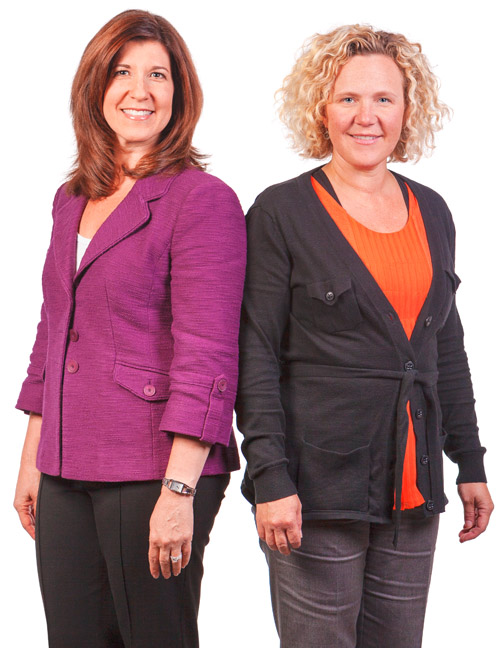 Acquaintances since the mid-1990s, when both women worked at Starbucks, Collie, 50, and Malek, 43, talked about sustainable growth, workforce and leadership issues, and their experiential business models, in which the experience of dining out — and grocery shopping — becomes (almost) as important as the food.
Acquaintances since the mid-1990s, when both women worked at Starbucks, Collie, 50, and Malek, 43, talked about sustainable growth, workforce and leadership issues, and their experiential business models, in which the experience of dining out — and grocery shopping — becomes (almost) as important as the food.
This interview has been edited and condensed.
OB: Salt & Straw opened three stores in less than two years, and a fourth location opened in Los Angeles in September. New Seasons is on track to open one to two stores per year. How do you maintain your identity as local food brands?
KM: We have two competitor ice cream companies opening in L.A. this summer. Both are making ice cream in New York and shipping it to Los Angeles. [Co-owner] Tyler Malek and I were like: ‘That would be so much easier!’ But our business model is built on the idea of offering flavors that reflect the local community and local producers.
So we spent over a year in L.A., getting to know local producers and developing relationships. We didn’t know if anyone would care we’re working with a local dairy, not to mention local brewers or coffee makers. We found they are really interested. Our model is so much more complex and expensive. It’s a big investment and it takes time. But it’s who we are.
WC: It’s the same as what Kim said, just on a different scale. Every time we open a store, we get micro local. We get a lot of food producers that may not be able to provide all the stores in Portland because they are so small. But we’ll let them come into individual stores, or as many stores as they might be able to produce for.
Each producer is different. Some might need help with product quality; some might need help with labeling and permits and how you get packaging to market. Some just need a break: How do they get to be able to sample, to be able to introduce products? You have to have the flexibility to withstand all that complexity. But that’s what makes it so fun.
(New Seasons’ “Local Finds” program helps small local crafters, food artisans and growers partner with the company to bring their products to market.)
OB: The local-producer movement is part of a larger food movement steeped in health, environment and equity issues. Do you view yourselves as avatars, as leaders of that movement?
WC: [Laughs] My sons would be thrilled to hear I’m an avatar.
KM: [Laughs] What’s an avatar?
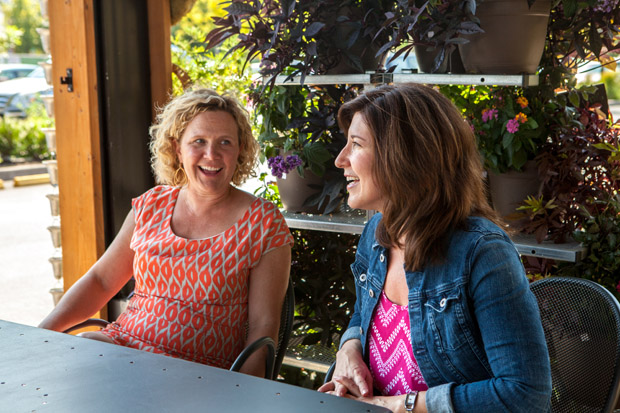
WC: I do think I have, as CEO of New Seasons, both a social and economic responsibility in how we contribute to Portland and the greater metropolitan area. There are a couple of things inside of that: First, the company was founded 14 years ago on the principle: “Our only success is if we can bring people with us.” You value how you take care of each other, your staff, your community and the environment as much as you value operating a business.
The movement is really multitiered. One is the sense of community and belonging. Food is a great way for people to come together. But the movement piece — the early days of New Seasons — was: How do you actually produce food in a way that is different from anybody else, to show you can be socially responsible and be profitable and be a healthy business? It’s a huge responsibility. You have to be on the cutting edge of how you bring people together so you can be part of the movement.
(In 2013, New Seasons became the first grocery store in the country certified as a “B-Corp” demonstrating commitment to social and environmental business practices.)
KM: We always talk about ice cream as this great blank canvas where we can tell a story about what’s happening in our city, whether that’s chocolate makers or beer brewers. That means making some decisions that are challenging from a business perspective. We’re spending a lot more money on ingredients or collaborations.
People always say, “How do you have long lines in February, with people standing in the rain?” We talk a lot about how we can be a generous brand: generous in terms of what we put into our ice cream, what we put into our staff and how we treat customers.
(A tourist attraction unto itself, the line at Salt & Straw typically stretches out the door onto the sidewalk.)
OB: How does price factor into the equation? You sell some of the most expensive ice cream and grocery items in the city.
KM: When I first wrote a business plan, I sent it to a friend of a friend who was a big investor. He sent it back, saying, ‘This is ridiculous. You can’t be a startup and offer health insurance, and all these things we said we are going to do.” I said, “I’m not going to listen to that.”
Our plan is about three things. First, we created our business model so we could afford to pay more, have a full benefits package and a nice work environment. And second, we want to give back to our local community. Lastly, we are investing in local artisans; it’s a lot more expensive to buy salt from Mark Bitterman at The Meadow than it is to buy salt at Cash & Carry. But we know him and he helped develop our recipe.
So we invest in those three areas, and the price reflects that. Also, when you come into our shop, it’s such a wonderful experience. We don’t usually think of what we do as: “Are we going to have ice cream here or there?” It’s more like: “Am I going to a movie, or a sports game or spending an evening with friends and family?” We like to think of ourselves as community gathering places where you can run into your neighbor, spend some time with your family. Hopefully we live up to that experience and provide that for our customers.
(A Salt & Straw single scoop costs $3.95. A half gallon of Organic Valley milk costs $2.29 at Fred Meyer; $2.79 at New Seasons.)
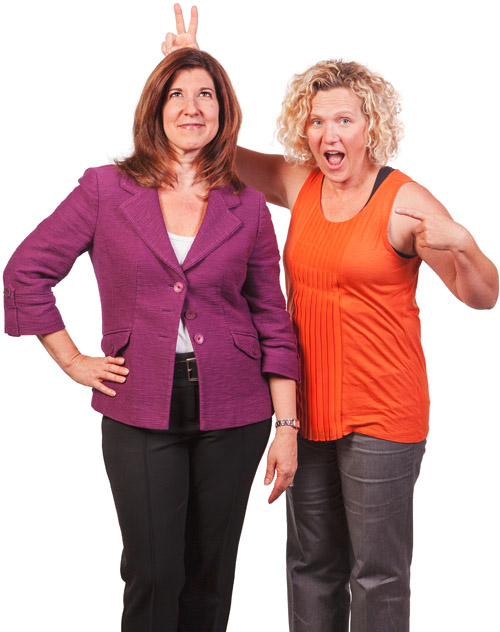 WC: When you look at price value, it means different things to different people. What we do is make sure we’re bringing together those folks who make great products with our customers who are looking for really exciting products. In the middle is the service experience, which is created by taking care of your staff. So the first question is: Are we treating staff appropriately?
WC: When you look at price value, it means different things to different people. What we do is make sure we’re bringing together those folks who make great products with our customers who are looking for really exciting products. In the middle is the service experience, which is created by taking care of your staff. So the first question is: Are we treating staff appropriately?
The second piece is sourcing of our product. When you look at our meat and seafood, it is more expensive, and part of the reason for that is how [our vendors] farm and the way the ranchers’ behavior is in alignment with our values. It’s the best you can get in the city, and we’re proud of that.
The third piece is the experience in the stores. We could say we’re not going to pay as much, we’re not going to have as much labor, or we’re going to penny pinch the margin. But the experience you have in the store would be very different.
OB: Elaborate on your workforce management strategy.
KM: [Looks at Collie] I’ve always wanted to talk to you about this topic.
WC: [Laughs]
KM: No, really. You do such a great job. Even before you were there, I would go around and ask the people who work at New Seasons questions about their benefits and training.
WC: We’ve always asked ourselves the question: How do we help our employees on their quests to be healthy and fulfilled? We like to think about health beyond the physical to the health of the whole being. We have lifestyle scheduling, which means schedules are set in advance and don’t change or get cut from week to week. We provide full medical benefits to staff that work 20 hours or more, and our staff take care of each other through participation in a voluntary community loan fund. Twenty percent of our after-tax profits go back to staff in the form of a flat and equitable profit-share plan.
(A profit-sharing program for Salt & Straw managers will soon be rolled out to the entire team. Employees pay $25/month for healthcare.)
OB: Starbucks recently announced an improvement to its scheduling practices.
WC: Yeah, they just did. We were first. [Laughs]
OB: What lessons did you learn from working at Starbucks? [Collie held several management and executive positions for the Seattle coffee chain from the mid 1990s to 2009. Malek was a marketing manager when she worked with Collie in the mid ’90s.]
KM: I will tell one story I will never forget. When was the Northridge earthquake?
WC: In ’92? Or ’93? Oh, my God; it’s blocked in my mind. [It was 1994.]
KM: Wendy was in L.A. I was in Seattle, and I was copied on a message to her team. It makes me tear up to think about it. Just the care she expressed for her staff. There was this extreme disaster, and it was like: “The business is going to be fine but what is going on with your people?” I was pretty young at the time, and that left a permanent mark on my memory.
WC: What both of us took away from our Starbucks days is if you take care of your people, they take care of everything else. I felt that as a partner at Starbucks and was able to give that to my people as a leader at Starbucks. It’s part of my values.
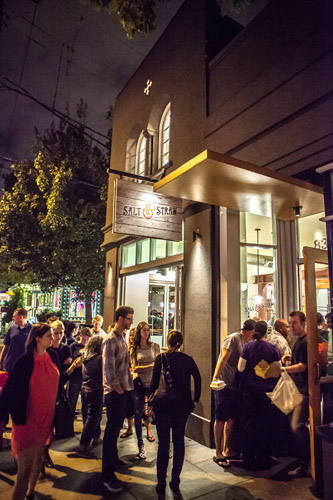 OB: Let’s return to the food movement. There’s a lot of talk about food deserts, especially outside the central city. Why haven’t you opened a store in Lents or in other East Portland neighborhoods?
OB: Let’s return to the food movement. There’s a lot of talk about food deserts, especially outside the central city. Why haven’t you opened a store in Lents or in other East Portland neighborhoods?
WC: It’s not that we’re not looking. It’s that we haven’t found a place yet. It’s about finding a place that can create the values we know are important to a neighborhood. The new store in University Park [to open in 2016], that took four years. You have to figure out all the mechanics: How do you operate and where do you put the trucks? Do you have the right demographics? We keep hitting the pavement.
KM: These are the criteria we look for: busy street traffic and great, busy, thriving communities. We’ve opened on some of my favorite streets in the city. We are always looking.
WC: Sometimes it’s not about having a physical store; it’s about how you participate with community. Even though we’re not in Lents, we are very involved with Zenger Farms, the local farmers market. So we’re still able to participate in those areas.
KM: Yes, and so are we: Zenger Farms is one of our biggest places where we buy a lot of our fruits and vegetables for our ice cream.
OB: Wendy, you are opening a store in Northeast Portland’s Grant Park neighborhood, a “food oasis” with five supermarkets. Kim, dozens of restaurants and cafes are springing up on those “busy streets.” How do you manage the competition?
WC: It’s getting harder because the natural -organic space is getting wider. You can get natural-organic product at Costco, Winco. So it does go back to the experience. What really differentiates us — our competitive advantage — is our people. Even when you have a situation like Grant Park, where you have established grocers, you still have an opportunity to meet customers’ needs and community’s needs in a different way.
We have to challenge ourselves to make sure we don’t fall into: “They’re doing this and what about that.” Someone said to me the other day: ‘I heard x-y-z competitor is now putting in burrito bars.” That was a huge compliment. We created that a couple of years ago at our Seven Corners store. The answer lies in paying attention on a daily, weekly, monthly basis and being flexible enough around what customers want.
(The Grant Park store will open in 2015 across the street from QFC, two blocks from Fred Meyer and six blocks from Whole Foods and Trader Joe’s.)
KM: Wendy, I was thinking about an email you sent me about a year ago. There was someone in town visiting New Seasons, and he put a note out and said, “I had an amazing experience; the company was called Salt & Straw and …”
WC: Oh, yes, I remember …
KM: He said: “A man came from behind the counter, took all this time with me, and I learned all about ice cream and the city.” Then he said, “I went to pay and the person in front of me had paid for me. What is this magical place?”
People get job offers in line, marriage proposals. I’m telling this story because, Wendy, I think you’re right: It’s that experience — that connection and ownership. I always have to be giving my team that pep talk, saying, “It’s OK [the competition] is doing that. We’re going to go do our thing and do it well. The more, the merrier.”
OB: We are living in a time of food innovation and food fads. Do both play a role in your business models?
WC: I said out loud to my produce guy the other day: “What’s the next kale?” He goes, “Oh, Wendy.” [Laughs] We’re always looking for the next thing we can provide our customers. We had raw foods on the shelf before anyone else. We’re able to learn from our peers and colleagues about what are the latest, greatest flavors or production or farming techniques. Sometimes it doesn’t work, which is OK. We have master chefs in our kitchen. They are plugged into the food scene, bringing information for the entire company.
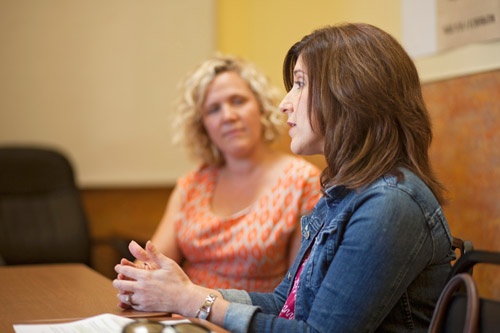 KM: We never do anything for shock value or to create buzz. If you see something odd on our menu, it’s because we met someone, maybe someone who is working with a really great uni [Japanese for sea urchin] product that we want to have in the ice cream. That seems really weird, but it’s because we know this person. It’s relationship based.
KM: We never do anything for shock value or to create buzz. If you see something odd on our menu, it’s because we met someone, maybe someone who is working with a really great uni [Japanese for sea urchin] product that we want to have in the ice cream. That seems really weird, but it’s because we know this person. It’s relationship based.
OB: Kim, you helm a startup. Wendy, you are the CEO of a more established company. How would you describe your personal and professional relationship?
KM: Wendy was really great helping me a year and half ago, when we barely started. She’s great with general business management, and specifically operations, which I don’t know about. Turns out that’s really hard. [Laughs] She would meet with me, bounce things off I was struggling with.
WC: A year ago, we were together every month. We have been horrible lately, but we do talk on the phone. I wish we could talk every week, but it winds up being more random. We’re both so busy.
OB: Why doesn’t New Seasons carry Salt & Straw ice cream?
WC: [Laughs] We’ve been talking about that for a year.
KM: We pack every single one of our pints by hand, and we don’t have capacity to add beyond our own stores. We sat down to discuss this and my team said, “We could do it.” But they looked a little scared, like this could be the thing that pushes them over the edge. To me it’s not worth it. But I would love to work with New Seasons. It would be like a cousin company.
WC: This is a great example. When Kim said we can’t do it right now, we said: “We totally understand.” When you’re that handcrafted, there is a capacity point. I would never put Kim in a position to compromise for our company.


